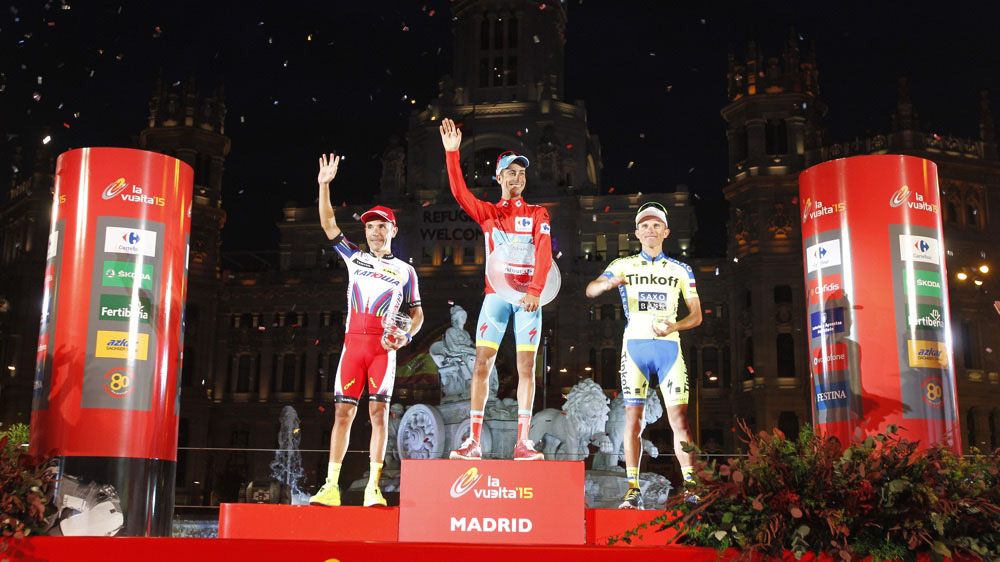The Vuelta a Espana 2016 (La Vuelta) starts this weekend and it’s shaping up as a battle between the same three riders who took to the start of the Tour de France as favourites with eventual winner Chris Froome, third placed Nairo Quintana and Alberto Contador all starting the Vuelta. Add Giro d’Italia runner up Esteban Chaves, Steven Kruijswijk and Alejandro Valverde into the mix and we have a classic Vuelta in the making.
Awaiting the riders is a typical Vuelta a Espana course starting with a team time trial, ten hilltop or mountain summit finishes and an individual time trial. It’s going to be a fantastic race.
Here’s a preview of the 2016 Vuelta a Espana.
Vuelta a Espana 2016 Route
In total the 71st edition of the Vuelta a España covers 3,315 kilometres over 21 stages with two rest days. There are 12 medium and high mountain stages, a team time trial and an individual time trial, and 7 flat stages before finishing in Madrid on September 11th.
We think the seven decisive stages will be stages 1, 8, 10, 14, 17, 19 and 20 … you can click any of the links below to the individual stages.
| Stage 1 | Stage 2 | Stage 3 | Stage 4 | Stage 5 | Stage 6 | Stage 7 | Stage 8 | Stage 9 | Stage 10 | Rest Day |
|---|---|---|---|---|---|---|---|---|---|---|
| Stage 11 | Stage 12 | Stage 13 | Stage 14 | Stage 15 | Stage 16 | Rest Day | ||||
| Stage 17 | Stage 18 | Stage 19 | Stage 20 | Stage 21 |
You can also click down to the Vuelta a Espana 2016 Contenders
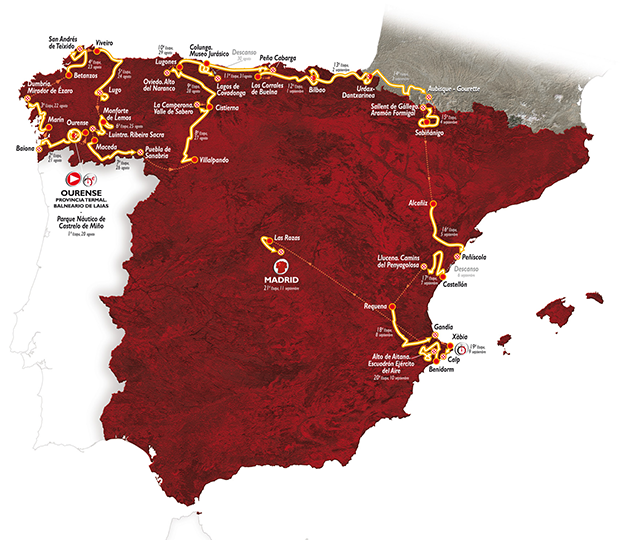
[adrotate group=”9″]
Stage 1 Ourense, Laias Health Resort / P.N. Castrelo de Miño Team Time Trial
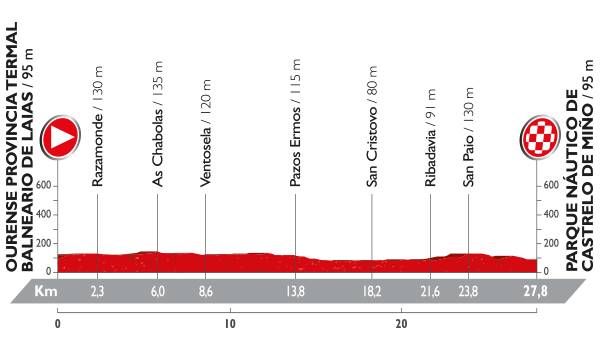
The 2016 Vuelta a Espana starts with a 29.4km team time trial around the dam of Castrelo de Miño. The teams of the general classification favourites will want to put in a strong performance to ensure their team leader doesn’t start with too much of a time deficit.
Stage 2 Ourense Thermal Capital / Baiona
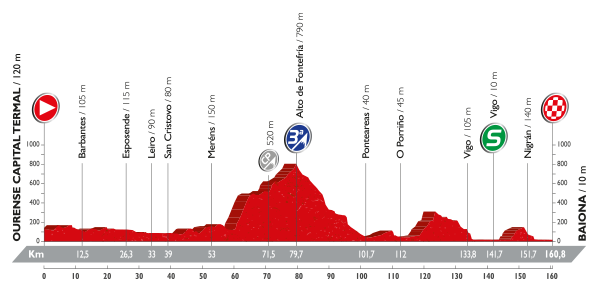
Stage 2 should be a day for the sprinters with only the catgeory 3 Alto de Fontefría to climb on the way to the Atlantic coast town of Baiona.
Stage 3 Marín / Dumbría. Mirador de Ézaro
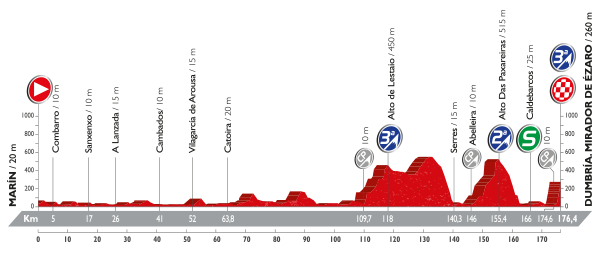
Stage 3 winds around the coast on flattish terrain for 110km before a succession of category 2 and 3 climbs finishing atop the 260m Mirador de Ézaro with an average gradient of 13%.
Stage 4 Betanzos / San Andrés de Teixido
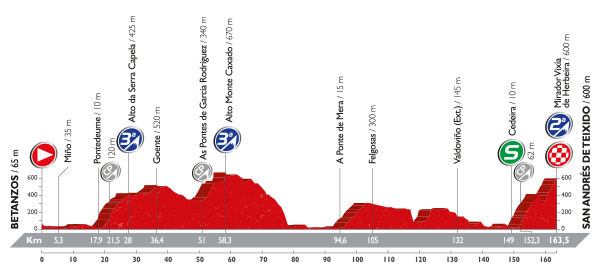
Stage 4 is another for the puncheurs finishing on the category 2 Alto Mirador de Veixia.
Stage 5 Viveiro / Lugo
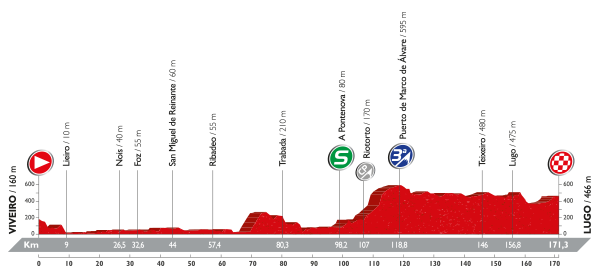
The sprinters have another chance today, after climbing the category 3 Puerto de Marco de Álvare 118km into the stage it’s a flat run to the finish 50km later.
Stage 6 Monforte de Lemos / Luintra. Ribeira Sacra
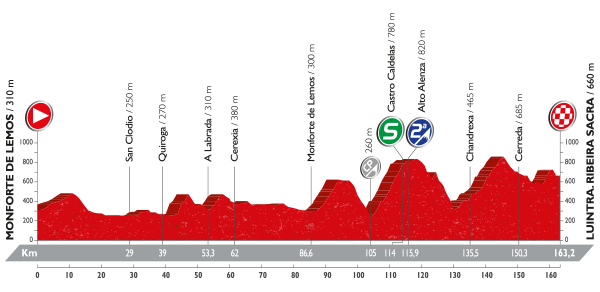
Stage 6 is the first of the medium mountain stages crossing the category 2 Alto de Alenza. Technical finish with windy uphill and downhill.
Stage 7 Maceda / Puebla de Sanabria
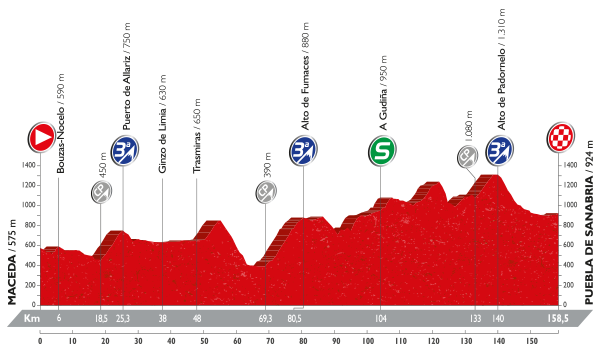
Another medium mountain stage between Maceda and Puebla de Sanabria featuring windy roads favouring attacking riding.
Stage 8 Villalpando / La Camperona. Valle de Sabero
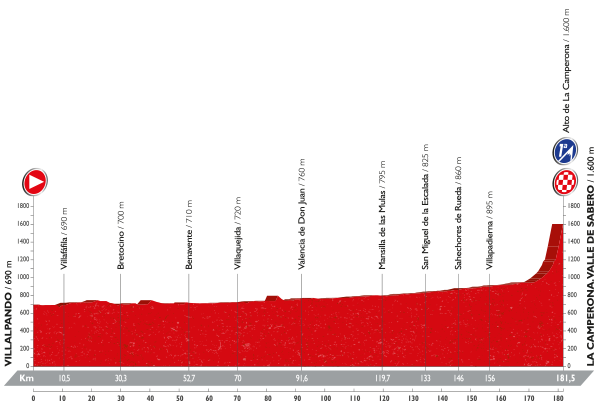
95% of the stage is perfectly flat but the big kick comes in the final 10km with the stage finishing with an ascent of the category 1 Alto de la Camperona with an average gradient of 7.4% and gradients of up to 22%. The GC riders will try and take time here.
Stage 9 Cistierna / Oviedo. Alto del Naranco
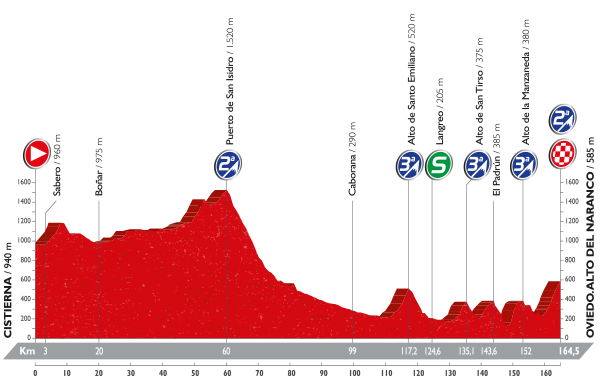
Stage 9 starts at 1,000 metres and climbs the Puerto de San Isidro to 1,520 metres after 60km, from there it’s mostly downhill to the finish but with four successive category 2 and 3 climbs to the final summit finish of Alto del Naranco it will be a tough attacking stage.
Stage 10 Lugones / Lagos de Covadonga
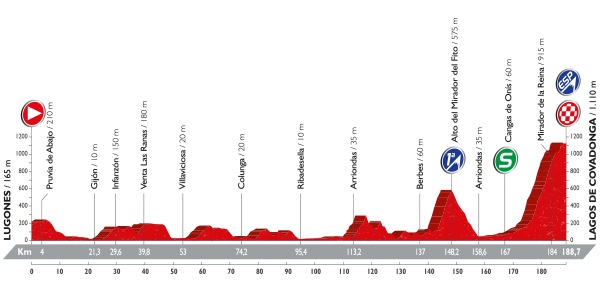
Stage 10 should see the first big shake up of the GC and the first real glimpse of who the winner might be, the first of the mountain stages comes before the first rest day and finishes on the ESP (HC) Lagos de Covadonga.
Stage 11 Colunga. Museo Jurásico / Peña Cabarga
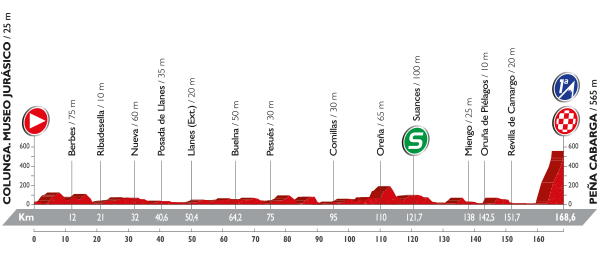
Stage 11 is another stage that taunts the sprinters, the first 160km are flat but the final 5.6km sees riders take on and finish at the summit of the category 1 Peña Cabarga climb with an average gradient of 9.8%.
Stage 12 Los Corrales de Buelna / Bilbao
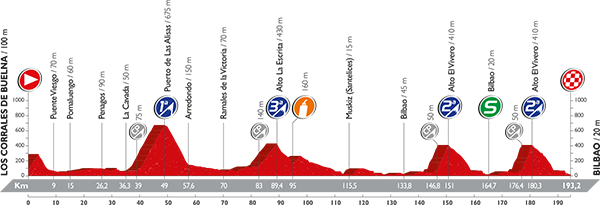
Hilly stage with a downhill run into the finish.
Stage 13 Bilbao / Urdax-Dantxarinea
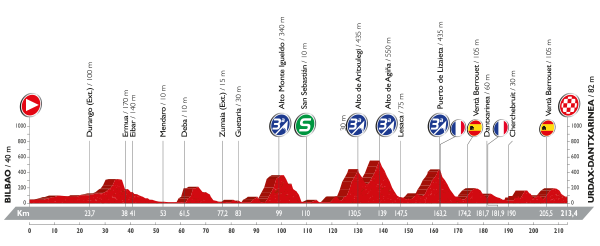
Stage 13 is the longest stage of the 2016 Vuelta a Espana, mostly rolling there are four category 3 climbs that should favour a breakaway win.
Stage 14 Urdax-Dantxarinea / Aubisque – Gourette
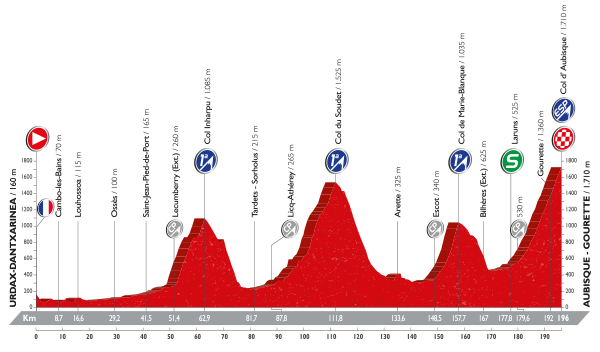
After a few kilometres the stage crosses into France for the remainder of the stage and crosses four maontain passes. First the Col Inharpu, then Col de Soudet and Col de Marie Blanque before taking on the summit finish of Col de Aubisque.
Stage 15 Sabinanigo / Sallent de Gallego. Aramón Formigal
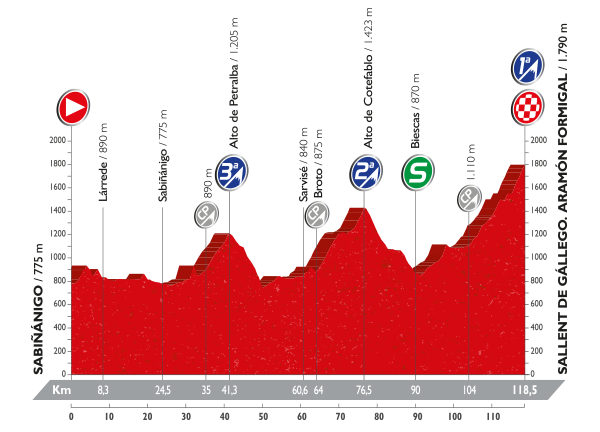
Back into Spain, stage 15 is only 118.5km in length finishing at the Aramon Formigal Ski Resort.
Stage 16 Alcaniz / Peñíscola
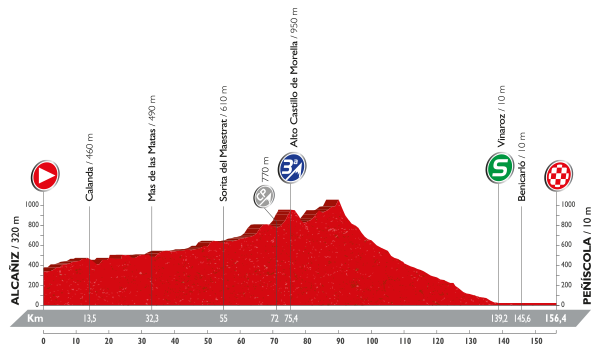
The sprinters get another chance before the second rest day, after a category 3 climb mid-stage it’s all downhill to the finish.
Stage 17 Castellón / Llucena. Camins del Penyagolosa
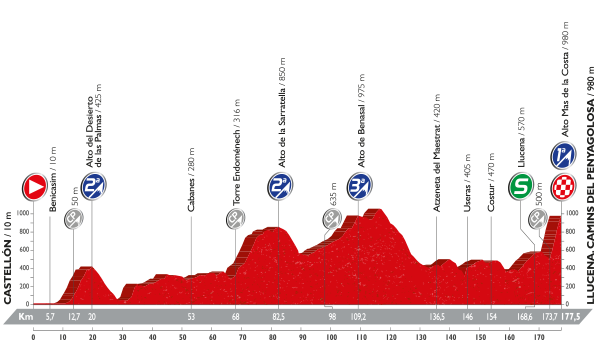
This is a tough stage following the rest day with three category 2 and 3 climbs before a summit finish of the category 1 Mas de la Costa with an average gradient of 12.5%.
Stage 18 Requena / Gandia
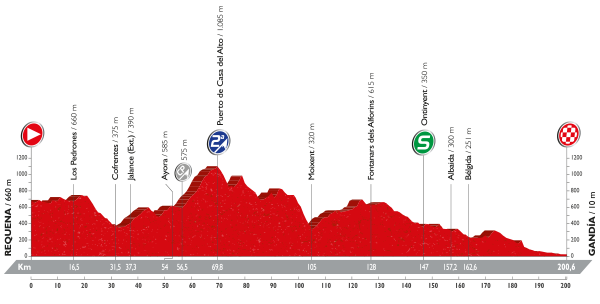
Flattish stage that should end in a sprint.
Stage 19 Xàbia / Calp 37km Individual Time Trial

The only individual time trial of the 2016 Vuelta a España is 37km long and mostly flat, there is minimal climbing so it will suit the strongest TT riders. Contador, Chaves and Quintana will be trying to limit loses before the final mountain stage.
Stage 20 Benidorm / Alto Aitana. E. Air Squadron
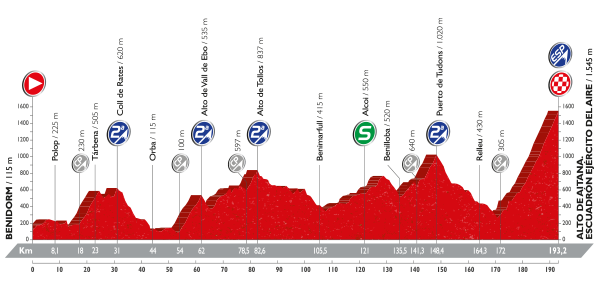
The final competitive stage for the general classification riders sees them take four category two climbs before the final summit finish of the Vuelta, the 21km long ESP (HC) Alto de Aitana.
Stage 21 Las Rozas / Madrid
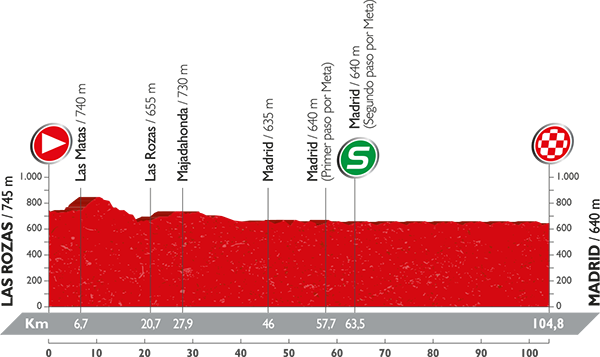
With the general classification decided the final stage of the 2016 Vuelta a Espana is largely ceremonial for the leaders but the sprinters have their last chance to win the stage before the final presentations.
[adrotate group=”14″]
Vuelta a Espana 2016 Contenders
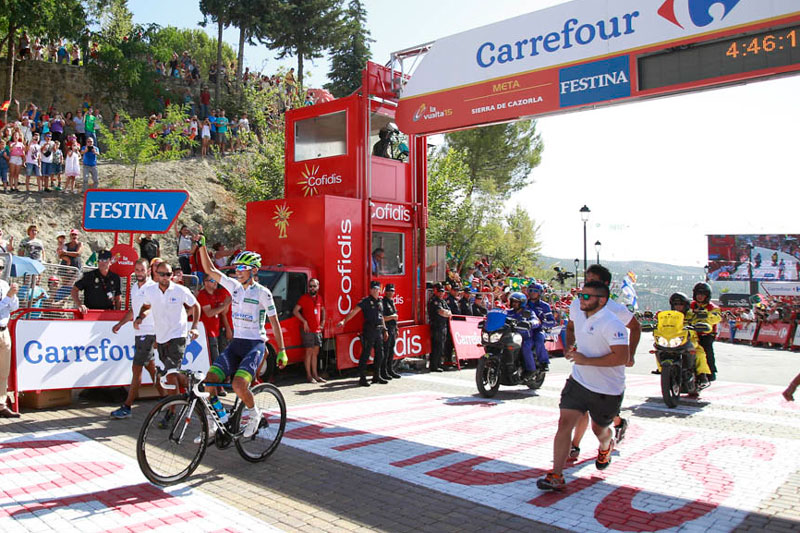
Alberto Contador had a disastrous Tour de France crashing heavily on the first stage and then again on the second stage before retiring prior to the first rest day. Contador raced the Clasica Ciclista San Sebastian at the end of July then won the Vuelta a Burgos last week. Alberto Contador will start the freshest of the top three riders and has won the Vuelta a Espana three times previously.
Chris Froome has raced the Olympic road race and finished third in the time trial since winning this years Tour de France and will start as one of the outright favourites to win the Vuelta. Marco Pantani in 1998 and Alberto Contador in 2014/15 were the last riders to win two grand tours in a row so it will be a test of Froome’s strength to back up his Tour de France win.
Nairo Quintana hasn’t raced at all since finishing third at the Tour de France but has confirmed he will be starting the Vuelta. Quintana didn’t look anywhere near his best form on his way to third place so it will be interesting to see how he goes at the Vuelta. That he was still able to finish third while not at his best hopefully means there is a lot left in the tank.
Esteban Chaves had a sensational Giro d’Italia eventually finishing second after leading into the penultimate stage. The Vuelta a Espana course will suit him and expect him to get off to a great start with the team time trial, it suits his Orica-BikeExchange team. Since the Giro d’Italia Chaves has only done one race, the Olympic road race. Esteban Chaves finished fifth at the Vuelta last year.
Steven Kruijswijk was on track to win this years Giro d’Italia but crashed heavily following Vincenzo Nibali’s attack down a mountain on stage 19. Like Chaves he’s hardly raced since the Giro only racing the Olympic road race and Clasica Ciclista San Sebastian.
As well as …
Mikel Landa will probably ride in support of Chris Froome but anything can happen in the Vuelta so he can’t be ruled out of a podium place, just look at Chris Froome’s own ride in the 2011 Vuelta as an example. Landa was riding a strong Giro d’Italia and would have been a favourite to win until suddenly pulling out of the race after the rest day with illness. Update: Mikel Landa has been withdrawn and replaced from Team Sky due to injury.
Alejandro Valverde is on track to race all three Grand Tours this year and in the fourteen years since his first Vuelta a Espana, yes fourteen, that’s something he’s never done before. Any other rider you would say it’s impossible for them to podium after already riding two grand tours but with Valverde anything is possible. Third at the Giro, sixth at the Tour while riding support for Quintana I would imagine he starts the Vuelta without any team orders in place.
Samuel Sanchez is BMC’s joint leader with a focus on the general classification. The BMC team will be strong in the opening team time trial so Sanchez should be well placed in the early stages.
Tejay van Garderen will jointly lead the BMC team with Samuel Sanchez but with a focus on stage wins instead of the GC. I think what that probably means in reality is we’ll wait and see after the first rest day as to who is the best placed rider.
Also watch out for Miguel Lopez, Andrew Talansky and Robert Gesink, its the Vuelta a España, anything can happen and it quite often does.
There should be at least nine riders from Australia and New Zealand with the provisional start list seeing these riders start, Nathan Haas (Aus) Dimension Data, Adam Hansen (Aus) Lotto Soudal, Rory Sutherland (Aus) Movistar Team, George Bennett (NZL) Team LottoNl-Jumbo, Patrick Bevin (NZL) Cannondale-Drapac and four riders from Orica – BikeExchange, Simon Gerrans (Aus), Jack Haig (Aus), Damien Howson (Aus) and Sam Bewley (NZL).
You can watch all stages of the Vuelta a Espana 2016 on Eurosport and follow all the latest news on twitter using #LV2016 and #LaVuelta
All images via Unipublic / lavuelta.com

